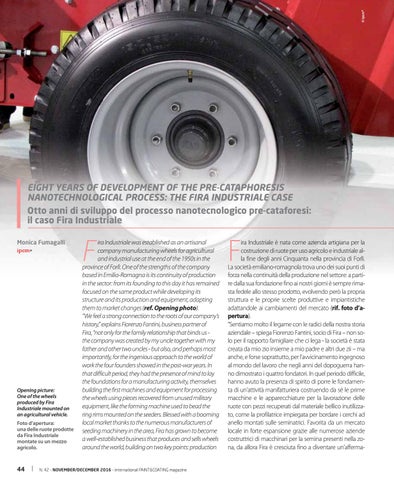© ipcm®
EIGHT YEARS OF DEVELOPMENT OF THE PRE-CATAPHORESIS NANOTECHNOLOGICAL PROCESS: THE FIRA INDUSTRIALE CASE Otto anni di sviluppo del processo nanotecnologico pre-cataforesi: il caso Fira Industriale Monica Fumagalli ipcm
®
Opening picture: One of the wheels produced by Fira Industriale mounted on an agricultural vehicle. Foto d’apertura: una delle ruote prodotte da Fira Industriale montate su un mezzo agricolo.
44
F
ira Industriale was established as an artisanal company manufacturing wheels for agricultural and industrial use at the end of the 1950s in the province of Forlì. One of the strengths of the company based in Emilia-Romagna is its continuity of production in the sector: from its founding to this day it has remained focused on the same product while developing its structure and its production and equipment, adapting them to market changes (ref. Opening photo). “We feel a strong connection to the roots of our company’s history,” explains Fiorenzo Fantini, business partner of Fira, “not only for the family relationship that binds us the company was created by my uncle together with my father and other two uncles - but also, and perhaps most importantly, for the ingenious approach to the world of work the four founders showed in the post-war years. In that difficult period, they had the presence of mind to lay the foundations for a manufacturing activity, themselves building the first machines and equipment for processing the wheels using pieces recovered from unused military equipment, like the forming machine used to bead the ring rims mounted on the seeders. Blessed with a booming local market thanks to the numerous manufacturers of seeding machinery in the area, Fira has grown to become a well-established business that produces and sells wheels around the world, building on two key points: production
N. 42 - NOVEMBER/DECEMBER 2016 - international PAINT&COATING magazine
F
ira Industriale è nata come azienda artigiana per la costruzione di ruote per uso agricolo e industriale alla fine degli anni Cinquanta nella provincia di Forlì. La società emiliano-romagnola trova uno dei suoi punti di forza nella continuità della produzione nel settore: a partire dalla sua fondazione fino ai nostri giorni è sempre rimasta fedele allo stesso prodotto, evolvendo però la propria struttura e le proprie scelte produttive e impiantistiche adattandole ai cambiamenti del mercato (rif. foto d’apertura). “Sentiamo molto il legame con le radici della nostra storia aziendale – spiega Fiorenzo Fantini, socio di Fira – non solo per il rapporto famigliare che ci lega - la società è stata creata da mio zio insieme a mio padre e altri due zii – ma anche, e forse soprattutto, per l’avvicinamento ingegnoso al mondo del lavoro che negli anni del dopoguerra hanno dimostrato i quattro fondatori. In quel periodo difficile, hanno avuto la presenza di spirito di porre le fondamenta di un’attività manifatturiera costruendo da sé le prime macchine e le apparecchiature per la lavorazione delle ruote con pezzi recuperati dal materiale bellico inutilizzato, come la profilatrice impiegata per bordare i cerchi ad anello montati sulle seminatrici. Favorita da un mercato locale in forte espansione grazie alle numerose aziende costruttrici di macchinari per la semina presenti nella zona, da allora Fira è cresciuta fino a diventare un’afferma-
